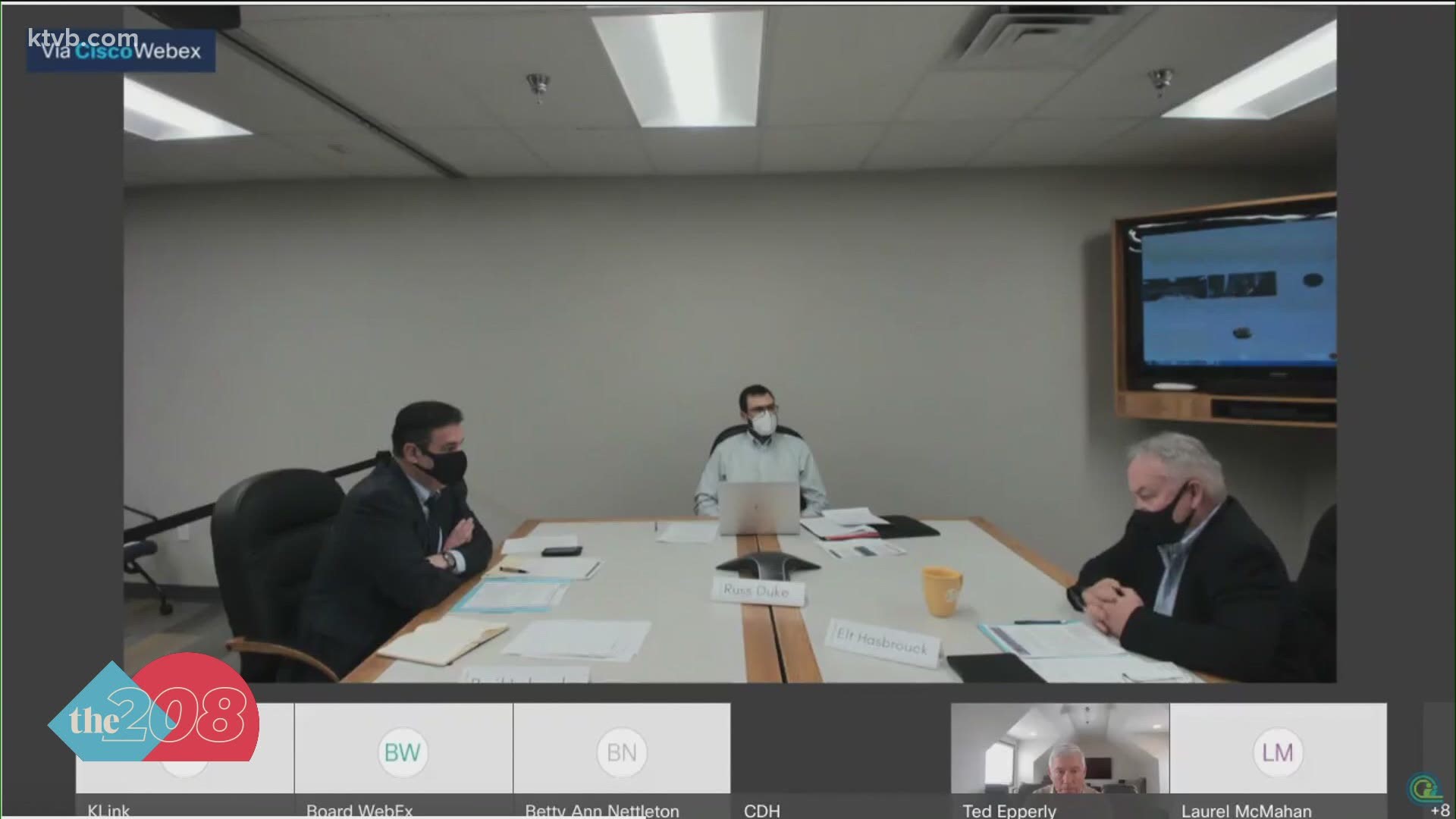BOISE, Idaho — The Central District Health Board voted unanimously to lift COVID-19-related health orders in both Ada and Valley counties Friday, even as health officials expressed concerns about a new and deadlier strain of the virus detected in the Boise area.
The Valley County order had mandated masks in public places and schools, while Ada County's was more comprehensive, dealing with masks, social distancing, and gathering sizes. The board's vote replaces those orders - which were punishable by law, though rarely enforced - with advisories that function as "strong recommendations" to continue adhering to guidelines aimed at preventing further spread of COVID-19. The vote does not supersede orders by individual cities, such as Boise's mask mandate, or overrule any orders put in place statewide by the governor.
Board members said in the meeting that they were heartened by declining COVID-19 transmission rates and hospitalizations, which have fallen dramatically since a November surge in cases.
As of the week of Feb. 7, the area has dropped back below the 5% positivity baseline, a metric long used to measure the prevalence of the virus across the state. All four counties that make up Central District Health - Ada, Boise, Elmore, and Valley - are showing improvement, according to Communicable Disease Program Manager Kim Link, and hospitals are returning to pre-spike levels.
Link added that transmission is easier to track as case numbers get lower. Investigators have recently found that most COVID-19 infections are coming from contact with an infected household member, followed by workplace transmission.
"People are going to work while they are infectious, and sometimes while they are exhibiting symptoms as well," Link said. "There is definitely a concern by people of potentially losing their job if they are out of work, so they are coming in when they are advised to be at home."
Community transmission, travel, small gatherings with non-household relatives or friends, and school sports - primarily basketball and cheerleading - are also contributing to the new cases reported, she said.
Link also pointed to the discovery of low levels of variant COVID-19 viruses in Boise-area wastewater earlier this week, stressing that the variant B.1.1.7, first discovered in the United Kingdom, was of particular concern. The U.K. variant is easier to contract: So much so that experts have warned it could be the dominant version of COVID-19 in the United States by the end of March, she said.
"This is a virus that we know is more infectious. It is a virus that we have mounting evidence to show causes more severe disease," Link said. "As we look at this, I know we've gone through these surges multiple times now and we have seen that it takes a matter of weeks for our case counts to move from the range of being in an OK position to really in dangerous levels. And then we see it takes months to get back to that pre-surge level."
Dr. Ted Epperly, who serves on the board, also sounded an alarm about the variant, telling his fellow board members that it is 25% more lethal than the original strain, and attacks a much younger group.
The age group most likely to be sickened by the UK variant is children aged 6 to 12, he said, with children under 6 as the second-most vulnerable group. Idaho's vaccine rollout is currently delivering doses to citizens 65 and over, with children's eligibility still far off.
"Those groups are not vaccinated, and they won't be vaccinated for a long time," Epperly said. "Most of those kids have young parents, and those young parents won't be vaccinated for some period of time."
If the board did choose to relax restrictions, Link said, she urged them to space them out to "allow for time in between those changes to be able to see the impact on community transmission."
Elt Hasbrouck, who represents Valley County, said he was in favor of lifting the orders. The mandates had been aimed at preserving capacity in hospitals across the state, and had been successful in that goal, he said.
"I think our decisions and our mandates that we put through worked great," he said. "I know a lot of people feel like their civil liberties were being impinged on, but hopefully you are still alive and can still protest because of what we did."
RELATED: Extreme weather blamed for COVID-19 vaccine shipment delays throughout Idaho, eastern Oregon
That said, he added, he felt as though the falling case rates supported relaxing the Ada and Valley County orders.
"To me, it seems like we have got this pandemic under control and the public has been educated very well on what they should do to protect themselves," he said.
CDH Director Russ Duke, who previously told KTVB that he did not believe the orders were still necessary amid falling case rates, noted that lifting the orders does not mean that Ada County and Valley County residents should stop wearing masks in public or relax their vigilance against COVID-19. Hand-washing, staying home when ill, practicing social distancing, and wearing face coverings are all still urged under the advisories.
"I think we're in a good position right now of managing the pandemic," Duke said. "That could change."
At KTVB, we’re focusing our news coverage on the facts and not the fear around the virus. To see our full coverage, visit our coronavirus section, here: www.ktvb.com/coronavirus.
Facts not fear: More on coronavirus
See our latest updates in our YouTube playlist:

